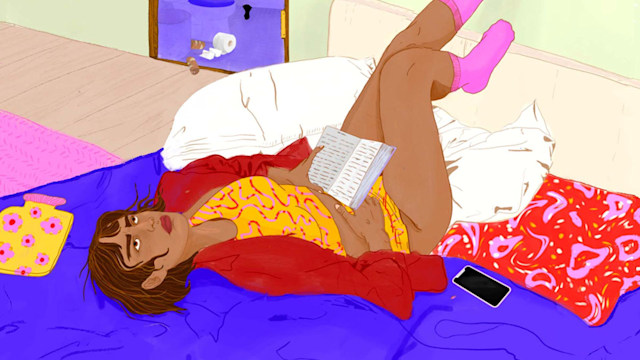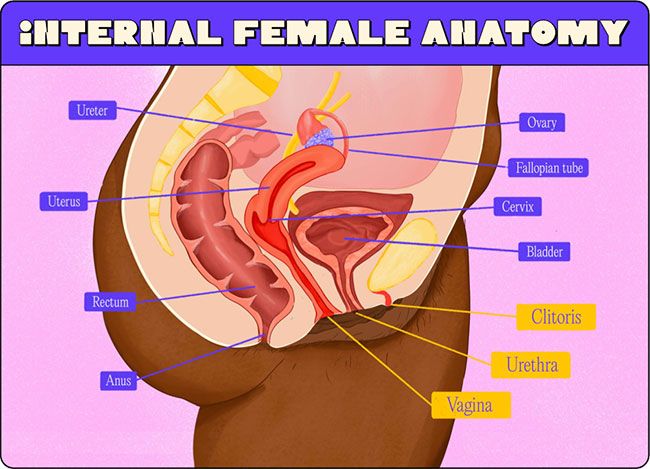There is sometimes a feeling of embarrassment when our bodies develop and start to function in ways we are unfamiliar with - particularly when it comes to intimate healthcare.
READ: Period and intimate hygiene products are soaring in sales
In our Back to School digital issue, guest-edited by Alesha Dixon, we take a look at how education in health has changed over the years, why it is important to remove the stigma surrounding female anatomy and what parents can do to normalise this.
The PSHE Association has presented teachers with lesson plans about vulval and vaginal health
It was announced last month that schoolchildren will be given lessons on vulval and vaginal health to counter the damaging misinformation they are seeing online via social media or pornography.
Exclusive: Inbetweeners star James Buckley and wife Clair get candid about parenting challenges
MORE: 36 symptoms of menopause and how to treat them - expert advice
The PSHE (personal, social, health and economic education) Association, which provides lesson plans for 50,000 teachers and schools, has teamed up with intimate health brand, Canesten, to present teachers with comprehensive lesson plans that teach 11 to 18-year-olds about intimate health.
Under a series called The Truth, Undressed, the new lesson plans include an accurate, diverse and non-sexualised portrayal of vulvas, pubic hair and true-to-life depictions of vaginal discharge intended to break down stereotypes and stigma and free people from shame and discomfort.
Liz Laming, from the PSHE Association, explained how parents and teachers alike should be open to having conversations. She told HELLO!: "Good education on health of all kinds, including intimate health, involves partnership between parents and schools where conversations at home are complemented by age-appropriate lessons in the classroom, and vice versa.
The educational series is called The Truth, Undressed
"Schools lessons may prompt such conversations, and it's an opportunity for parents to approach these important topics."
Why these lessons have taken such a long time to materialise, Liz explained: "With the introduction of statutory Relationships, Sex and Health education, we know currently children are being taught these subjects however there is more of a focus on health education, such as the changing adolescent body, puberty, anatomy and personal healthcare.
RELATED: Best period pants for girls of all ages: From M&S to Bodyform, Sainsbury's & more
"However, a key part of this education that is missing is around the education of intimate health and that is why these comprehensive lesson plans have been created."
She continued: "Historically, there has been a lack of learning about intimate health and related conditions. New compulsory health education requirements provide a universal opportunity to address such issues effectively and appropriately, using high-quality, evidence-based resources such as these.
Education in health has changed over the years
"To address this clear need, these lesson plans will equip teaching professionals with lesson plan materials to teach secondary students the reality of how our bodies look and behave." Teachers can choose lesson plan versions with either photographs, realistic illustrations, or without imagery. Teacher guidance on whether and how to use these resources is also provided.
These lessons are being taught to both boys and girls, ensuring material will be "accurate and inclusive".
MORE: Bake Off star Crystelle Pereira's five-day packed lunch menu will save you time and money
"We want everyone, both boys and girls, to be shown the reality of how our bodies look and behave in a safe and trusted teaching environment," shared Liz. "We have ensured our lesson material is accurate and inclusive, for example through the diversity represented in the imagery used and the evidence-based approaches, so that this new education programme tackles shame and stigma front-on through education at scale.
"To support this, our recommendation is that the teaching materials are shown within the usual class group setting as with other health education subject matter. We believe it's important to educate both boys and girls, so that we empower society as a whole on the subject of intimate health and breakdown the taboo of this topic."
Over the years, the truth on female anatomy has been dressed up and is somewhat overshadowed. It's been revealed that only 6 per cent of UK women (aged 18 to 24) found out about intimate health conditions through school or university education, and just under two-thirds (60 per cent) only found out about vaginal infections when they first experienced them.
Unfortunately, research also revealed that 46 per cent of women in the UK are worried about the appearance of their vulva, with many admitting they would change something about it if they could. Clinical Psychologist, Dr Elly Hanson, told HELLO!: "Sadly, we have a long history of the vulva and vagina being seen in limiting and derogatory ways in society. I view it as no coincidence that the swear word we see as the most offensive in Britain denotes the female genitals.
"Historically, there has been a lack of learning about intimate health and related conditions"
"A seminal academic paper in 2001 found that the vagina and vulva have been commonly and persistently represented in society as absent, passive, vulnerable, dirty, smelly, shameful, and even dangerous.
"Not too much seems to have changed since, with the exception of the rise of the online porn industry, meaning that now many people, including adolescents, are regularly exposed to sexual imagery of a specific type of vulva, representing a narrow ideal at odds with the reality that vulvas are highly diverse in appearance (in short, different is normal).
"Vulvas and vaginas are usually not spoken about (in comparison to penises), there is a sense of them being shameful and hidden, apart from when 'manicured' versions of them are on display for sexual gratification."
She added: "It's therefore not surprising that negative feelings, a lack of knowledge, and myths about the vulva and vagina are common, with hugely detrimental consequences, especially for girls and women. This situation fuels shame, anxiety, body consciousness and a sense of inadequacy. Given all of this, it's vital that young people are supported with education that increases their understanding and helps them take an accepting and affirmative approach to their bodies."
Like this story? Sign up to the HELLO! Family Hub newsletter to get other stories like this delivered straight to your inbox.

